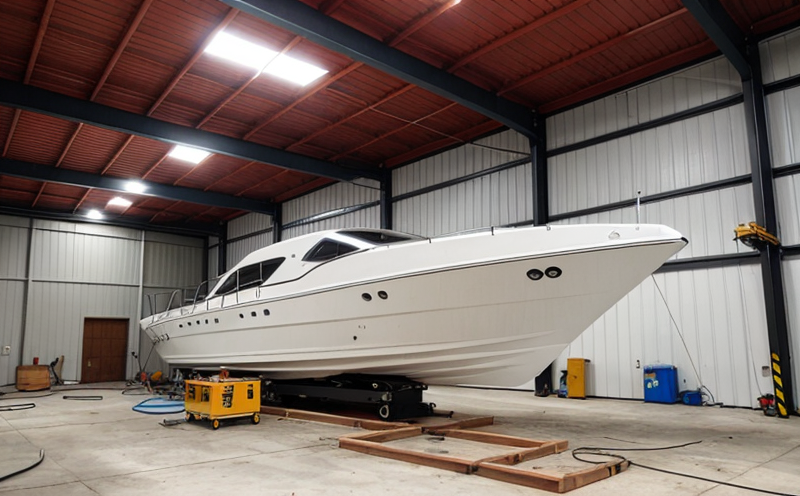ISO 19902 Fixed Steel Offshore Structure Integrity Testing
The ISO 19902 standard provides a comprehensive framework for ensuring the structural integrity of fixed steel offshore structures. This standard is critical in maintaining safety and reliability, particularly given the high-stress environment that these structures operate within. Compliance with this standard ensures that structures are robust enough to withstand harsh conditions such as extreme weather, heavy seas, and constant loading pressures.
The testing procedure outlined in ISO 19902 involves a series of stringent checks designed to verify the structural soundness of steel offshore installations. These tests include non-destructive testing (NDT) methods like ultrasonic testing, radiography, magnetic particle inspection, and eddy current testing. The aim is to identify any potential defects or weaknesses in the structure that could lead to failure.
The process begins with thorough preparation of the specimen, which involves cleaning the surface to remove any dirt, rust, or paint that might interfere with the testing results. Once prepared, the structure undergoes a series of inspections using various techniques tailored to detect different types of defects. This meticulous approach ensures that no potential issue is overlooked.
The acceptance criteria for passing this test are stringent and align with international standards such as ISO 19902. A structure must meet all specified requirements without any deviations from the accepted norms. Failure to comply can lead to significant risks, including structural failure and potential loss of life or property damage.
Our laboratory is equipped with state-of-the-art equipment capable of conducting these tests accurately and efficiently. Our team of experts ensures that every step of the process adheres strictly to ISO 19902 guidelines, providing clients with reliable test results they can trust.
In summary, ISO 19902 Fixed Steel Offshore Structure Integrity Testing is essential for ensuring the long-term safety and operational reliability of fixed steel structures in offshore environments. By adhering rigorously to this standard, we contribute to minimizing risks associated with these critical assets.
Why It Matters
The integrity of fixed steel offshore structures is paramount for the safety and efficiency of operations in the marine sector. These structures are exposed to severe environmental conditions, including high winds, waves, and corrosive elements, which can lead to structural deterioration over time if not properly maintained.
Regular testing ensures that any potential issues are identified early, allowing for timely repairs or replacements before they escalate into critical failures. This proactive approach helps in maintaining operational continuity and reducing downtime associated with unexpected breakdowns.
Beyond safety considerations, compliance with standards like ISO 19902 also plays a crucial role in regulatory adherence and reputation management. It demonstrates a commitment to quality and excellence, which is vital for securing contracts and fostering trust among stakeholders.
Failure to comply can result in severe consequences, including legal penalties, reputational damage, and increased insurance premiums. Therefore, investing in robust integrity testing programs not only enhances operational safety but also protects against financial losses and operational disruptions.
In essence, ensuring the structural integrity of offshore structures through rigorous testing is a cornerstone of sustainable operations in the marine industry. By adhering to international standards such as ISO 19902, organizations can safeguard their assets and ensure long-term viability.
Industry Applications
| Application | Description |
|---|---|
| Floating Platforms | Testing floating platforms ensures stability and safety in dynamic marine environments. |
| Pile Foundations | Evaluating the integrity of pile foundations helps prevent structural failures under load. |
| Offshore Wind Turbines | Ensuring wind turbines are secure against harsh weather conditions is crucial for both safety and efficiency. |
| Submarine Pipelines | Testing submarine pipelines guarantees their durability in deep-sea environments. |
| LNG Carriers | Checking the structural integrity of LNG carriers ensures they can withstand extreme conditions during transportation. |
| Offshore Oil Platforms | Regular inspection of oil platforms maintains operational safety and efficiency in challenging marine environments. |
| Marine Structures | Evaluating the structural integrity of marine structures helps ensure they meet stringent international standards. |
| Fixed Steel Offshore Structures | Testing fixed steel offshore structures ensures their reliability and safety in various operational scenarios. |
The above table highlights some key applications where ISO 19902 compliance is vital. Each of these areas benefits significantly from rigorous integrity testing, ensuring not only safety but also long-term operational effectiveness.
Competitive Advantage and Market Impact
Compliance with ISO 19902 can provide significant competitive advantages in the offshore marine sector. It demonstrates a company’s commitment to safety, reliability, and regulatory compliance, which are critical factors for clients when selecting suppliers or contractors.
Organizations that excel in maintaining high standards of integrity testing not only enhance their reputation but also attract more business opportunities. By ensuring that all structures meet the highest quality benchmarks, companies position themselves as leaders in terms of safety and operational excellence.
The market impact of adhering to these standards extends beyond individual enterprises; it contributes positively to the broader industry by setting a benchmark for best practices. This collective effort fosters an environment where innovation can thrive while maintaining the highest levels of safety and reliability.
Moreover, compliance with ISO 19902 can help reduce insurance costs and operational risks, making organizations more attractive partners for investors and clients alike. In essence, adherence to these standards is not just a regulatory requirement but also a strategic imperative in today’s competitive market environment.





